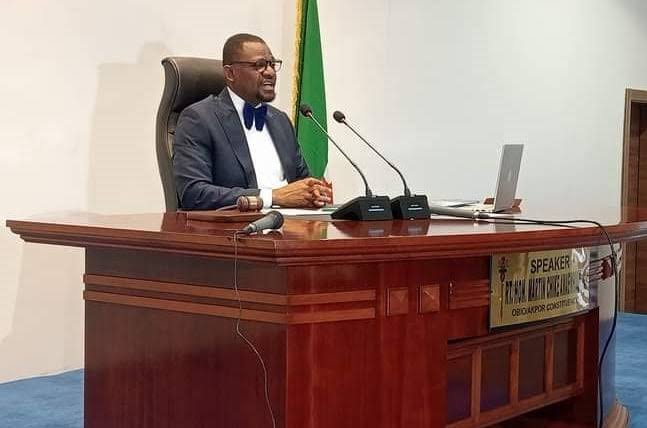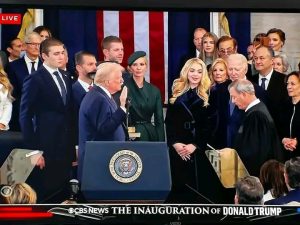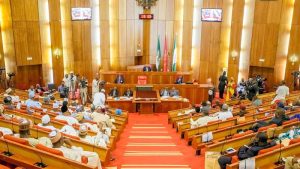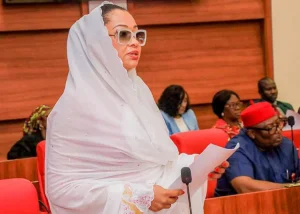Rivers Assembly Backs Emergency Rule, Pledges Sole Administrator Support
In a significant political development, the Rivers State House of Assembly has expressed its full support for President Bola Tinubu’s declaration of a state of emergency in the state. The legislative body also pledged to offer unwavering backing to the newly appointed sole administrator, retired Vice Admiral Ibok-Ete Ibas, who will be responsible for the administration of the state during the emergency period. This decision follows months of political instability and a power struggle that has left the state in turmoil.
The declaration, which was made by President Tinubu on March 18, 2025, comes after a prolonged period of conflict within the state’s political leadership, involving Governor Fubara, his deputy, and key members of the state assembly. In response to these developments, the state assembly, particularly the faction loyal to former Governor Nyesom Wike, has welcomed the state of emergency, acknowledging that the situation had reached a point where such an intervention was necessary to restore peace and governance.
Rivers State, located in the southern part of Nigeria, has long been known for its political vibrancy. However, in recent months, the state has been plagued by deep-rooted political conflicts that have paralyzed its governance. These conflicts primarily revolve around the deteriorating relationship between the sitting Governor Fubara and his predecessor, Nyesom Wike, who now serves as the Minister of the Federal Capital Territory (FCT). Wike’s influence over the state’s political landscape has been significant, but his transition to a federal role has sparked intense power struggles within the state.
The political chaos reached its peak when factions within the Rivers State House of Assembly, loyal to both Wike and Fubara, clashed over the control of the legislature. This fracturing of the assembly’s leadership led to legislative gridlock, undermining the ability of the state government to function effectively. The situation was further compounded by allegations of constitutional violations, including the disobedience of court orders by the state’s political leadership.
Amidst this turmoil, President Bola Tinubu took decisive action on March 18 by declaring a state of emergency in Rivers State. The declaration, which is a rare and significant move in Nigeria’s political history, suspends the governor, his deputy, and all members of the state assembly. This measure effectively removes the current political leadership from power, placing the state under the control of a sole administrator.
In his statement, President Tinubu justified the decision as necessary to address the political instability and constitutional violations that had led to a breakdown in governance. He nominated retired Vice Admiral Ibok-Ete Ibas to serve as the sole administrator, tasking him with restoring order and ensuring that the state functions in accordance with the law.
Vice Admiral Ibas, a seasoned military officer with a distinguished career in the Nigerian Navy, is seen as a figure capable of bringing stability to the state during this period of uncertainty. His appointment is expected to allow for a more neutral and focused administration, free from the partisan divisions that have plagued the state’s leadership.
The Rivers State House of Assembly, which has been deeply divided along factional lines, has officially expressed its support for the state of emergency and the appointment of the sole administrator. The statement issued on March 19, 2025, by the Speaker of the Assembly, Martin Amaewhule, reflects the position of the faction loyal to former Governor Nyesom Wike. In the statement, Amaewhule commended the president’s decision, describing it as being in the “best interest of the country.”
The speaker went on to highlight that the political crisis in Rivers had reached a point where the state’s governance had been severely compromised. He attributed this to what he called “serial disobedience to court orders and constitutional breaches” by the governor. Amaewhule also emphasized that Governor Fubara’s failure to uphold his oath of office had led to a collapse of governance in the state, creating a situation where the legislature could no longer function effectively.
Amaewhule further argued that the governor’s “despotic and tyrannical actions,” as confirmed by court rulings, had obstructed the functioning of the Rivers State House of Assembly, a key branch of government. The assembly had been effectively paralyzed, unable to carry out its legislative duties due to the ongoing conflict and political infighting.
The decision to appoint a sole administrator is seen as an effort to restore order and governance to Rivers State. In his statement, Speaker Amaewhule assured the people of Rivers that the assembly would fully cooperate with Vice Admiral Ibas, pledging to provide any support necessary for him to succeed in his role. The speaker stressed the importance of collaboration between the sole administrator and the legislative body to navigate the state through the emergency period.
“We assure you all, our constituents, that we would abide by this declaration even though it is not what we prayed for,” the speaker’s statement read. While acknowledging that the situation was not ideal, the assembly members recognized that the president’s intervention was necessary to safeguard the future of the state and its people.
Amaewhule called on the residents of Rivers to remain calm during this challenging period, urging them to trust the sole administrator to take charge in the best interest of the state and the nation. The assembly’s pledge of support is a significant gesture, signaling that, despite internal divisions, the legislative body is willing to put the interests of the state above partisan politics.
The declaration of a state of emergency in Rivers State has far-reaching implications for the state’s political landscape. First and foremost, it marks the end of the tenure of Governor Fubara and his deputy, who will no longer have a role in the administration of the state. The suspension of the state assembly means that legislative functions will be temporarily suspended, with all decision-making powers now vested in the sole administrator.
While this move is aimed at restoring stability, it also raises questions about the future of governance in Rivers. The sole administrator, although tasked with restoring order, will face significant challenges in unifying a state that has been fractured by political rivalries. Moreover, the move may set a precedent for how the federal government addresses political crises in other states, raising concerns about the potential for further interventions in local governance.
For the people of Rivers, the immediate concern is whether the sole administrator can bring about meaningful change and whether this emergency rule will lead to a return to democratic governance. The president’s intervention may have been necessary, but it also signals that the state’s political system is in need of profound reform to prevent similar crises in the future.
As Rivers State enters this period of emergency rule, much depends on the ability of Vice Admiral Ibas and the state’s political leaders to work together in navigating the challenges ahead. The state’s residents, weary from months of political instability, will be looking for signs of progress and hope that the emergency rule can lead to a more stable and functional government.
While the Rivers State House of Assembly has pledged its support to the sole administrator, it is clear that this is a time of uncertainty for the state. The actions of the federal government, particularly in how it handles the transition back to civilian governance, will play a critical role in determining the future trajectory of Rivers State’s political landscape.
The people of Rivers, having endured political strife for an extended period, will be hoping that the emergency rule and the appointment of a sole administrator will bring about the stability and leadership necessary to move the state forward, ensuring that governance can return to its rightful course.
Source: LIB





